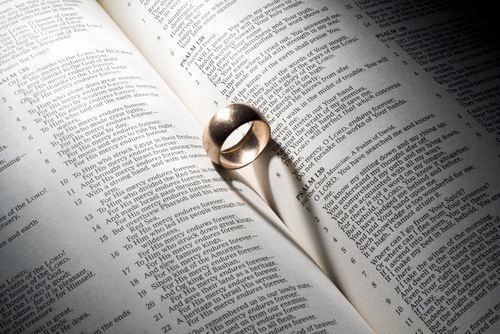Traditional Wedding Vows From Different Faiths

Of the more than 860 million words you’ll say in the course of your lifetime, there may be none more important than your wedding vows. These are the promises you make to your beloved in front of your friends and family, and in front of whatever deity you may believe in. When it comes to your wedding vows, there’s a lot to consider and knowing some wedding vows from different faiths can help you find the right words for your special day.
Traditional Christian Vows
If you’ve ever been to a Christian wedding, you’ve probably heard the same vows over and over.
“I, [name], promise to take you, [name], to be my lawfully wedded husband/wife, to have and to hold from this day forward, for better, for worse, for richer, for poorer, in sickness and in health, to love and to cherish, till death us do part.”
Some Christian traditions mention “to love, honor and obey” in place of “to love and to cherish.”
You may also recite I Corinthians: 4-8 as part of your vows.
“Love is patient, love is kind. It does not envy, it does not boast, it is not proud. It does not dishonor others, it is not self-seeking, it is not easily angered, it keeps no record of wrongs. Love does not delight in evil but rejoices with the truth. It always protects, always trusts, always hopes, always perseveres. Love never fails.”
You could include the vow Ruth made to Naomi in Ruth:1-16, when she expressed her love.
“Where you go, I will go, and where you stay, I will stay. Your people will be my people and your God my God.”
Traditional Hindu Vows
These vows are taken as the couple walks around the flame honoring Agni, the fire god.
“Let us take the first step to provide for our household a nourishing and pure diet, avoiding those foods injurious to healthy living. Let us take the second step to develop physical, mental, and spiritual powers. Let us take the third step to increase our wealth by righteous means and proper use. Let us take the fourth step to acquire knowledge, happiness, and harmony by mutual love and trust. Let us take the fifth step so that we are blessed with strong, virtuous, and heroic children. Let us take the sixth step for self-restraint and longevity. Finally, let us take the seventh step and be true companions and remain lifelong partners by this wedlock.”
Traditional Pagan Vows
If you’re having a traditional pagan wedding, the high priest or high priestess will ask you, “What do you bring to this marriage?”
Your response can be, “I bring love and respect. I love [name] as I love myself, honoring and respecting them in all things. I will always support them in everything they do and join with them in their love and praise of the gods in whom we believe. I will defend their life before my own. May the gods give me the strength to keep these vows.”
Your pagan vows may also include the promise “to love, honor and cherish so long as love shall last,” as opposed to the Christian vow to do so “until death do us part.”
Writing Your Own Vows
Of course, you always have the option of writing your own vows. You can include whatever you want in your vows, including the moment you met, when you first fell in love and the promises you want to make for the future. Your vows could be long and flowery, short and sweet, or medium-length and funny. Whatever you say, your vows should reflect your personality and the life you want to build with your partner.
Whether both brides or both grooms choose the same type of vows is completely up to the happy couple. You may want to keep your vows secret until your wedding day, or share them to coordinate with each other. Whatever you vow, keep those promises to each other to have a long, happy marriage.














